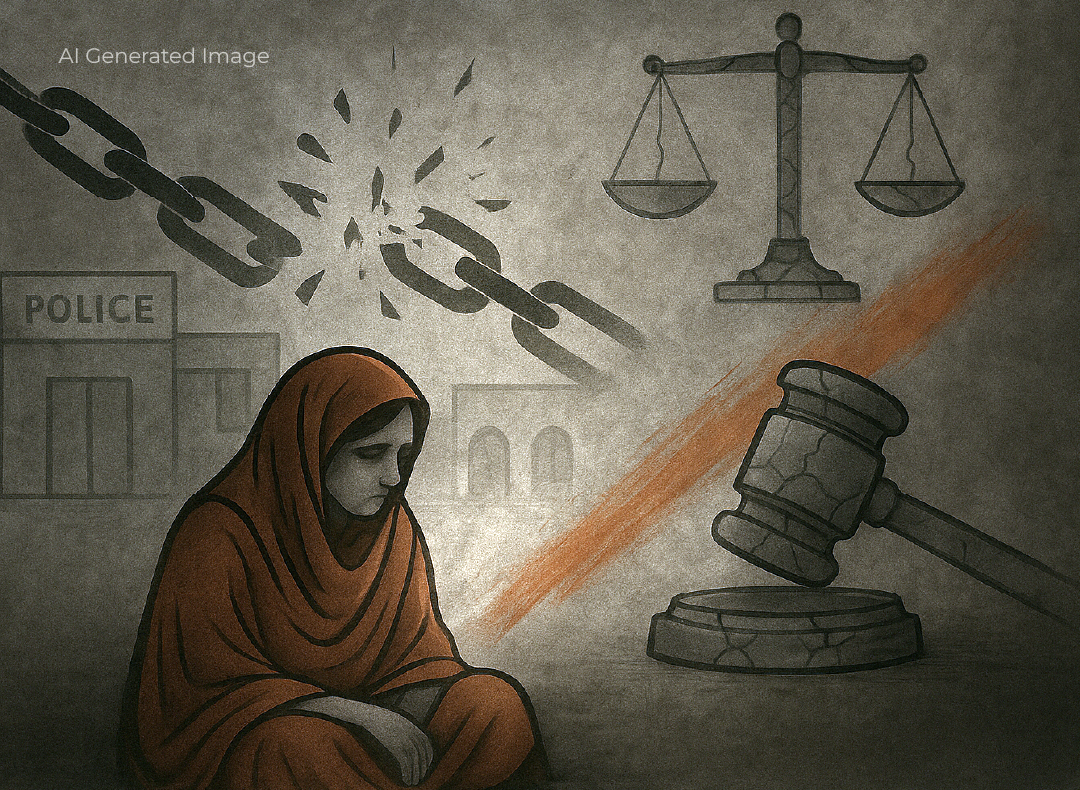Thirty-five years old Farzana (not her real name), a resident of Qadirabad locality in Mianwali city, was alone at her home when her close relative, Azizullah, entered the house and raped her.
Her husband, a bus driver, had gone to Bannu as a part of his work. This is what she told the City Police Station on April 9 in her first information report (FIR) and the police registered a case the same day.
Despite the passage of months, when this report was filed, the suspect had not been arrested. Sub-Inspector Jabal Al-Warid, the investigating officer at the City Police Station, says the police had registered a case with any delay under Section 376 of the Pakistan Penal Code and the victim underwent immediate medical examination. She claims that the police fully supportedthe victim.
Farzana says the family elders were not in favour of filing a case and wanted the matter to be resolved at home.
“But my husband went with me and filed an FIR with the police station.
Now, except for my husband, all the men in the family are pushing for reconciliation because our frequent visits to the police station and court are hurting their honour.”
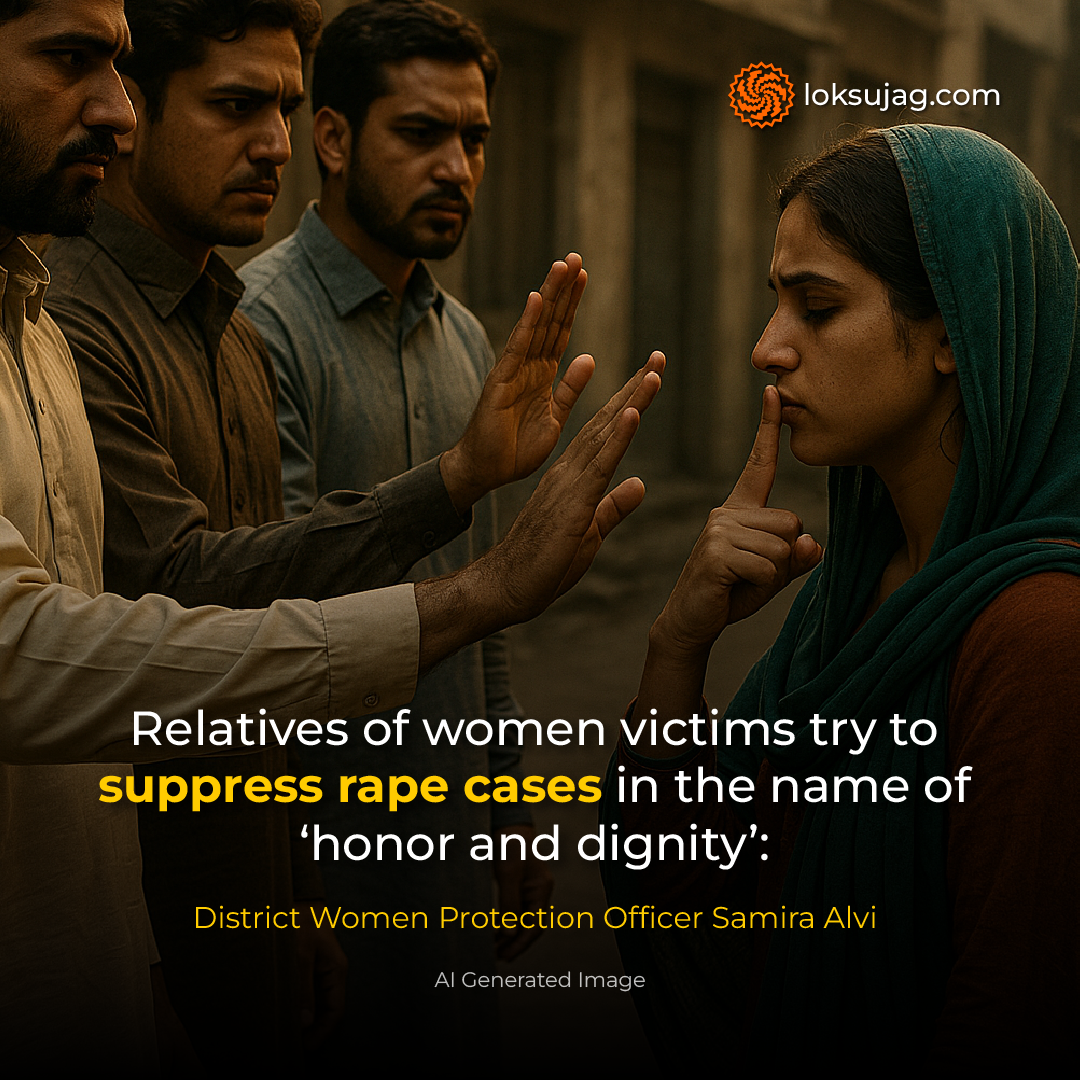
Social stigma attached with rape cases
A report by the Sustainable Social Development Organization (SSDO) shows that 4,641 cases of rape were reported in Punjab in 2024. Lahore, the provincial capital, topped the list with 532 cases, followed by Faisalabad, Kasur and Okara districts with 340, 271 and 213 cases, respectively.
According to the list, a total of 31 rape cases of women were registered in the Mianwali district last year.
To the question whether rape incidents are less common or underreported in Mianwali compared to Lahore, Faisalabad, Okara and Multan, most lawyers and social workers here seem to agree that the majority of people in Mianwali do not report such incidents despite being aware of the laws.
District Women Protection Officer Sameera Alvi says that in the feudal rural society, women are considered a symbol of honour and dignity and that’s why the relatives of the affected women usually try to suppress incidents of sexual violence or rape.
The family of Muhammad Bilal (not real name) has been living on the outskirts of Isakhel for decades. Two years ago, an influential person raped his 16-year-old daughter. Instead of filing a case against him, he left the area with his wife and children and settled in a rented house in Mianwali city.
“I am no longer able to face anyone in his village, how can I take my daughter to the police or court?”
Samira Alvi says that even despite overcoming stumbling blocks of the police stations and the heavy expenses, very few people get justice. “That is why only a few women dare to file such a case,” she adds

Only 4pc conviction rate in rape cases
According to SSDO statistics, the conviction rate in the rape cases in Punjab last year (2024) was only 0.4pc.
According to the District Judicial Complex Mianwali, from January 1 to December 31, 2024, a total of 97 cases of rape of women were pending in the courts here, including the pending cases of the previous year. During this period (one year), 14 cases were decided. In only one case, the accused was convicted, the accused involved in 11 cases were acquitted while the accused in two cases were never caught by the police. Thus, the conviction rate, according to the court, was 7.14%.
According to the court records, there was no reconciliation between the parties in none of the aforementioned cases.
When Muhammad Bilal was repeatedly asked why he did not file a rape case against his daughter, he replied passionately.
“Has anyone else gotten justice from the police station? Instead of filing a case, I thought it would be appropriate to leave the area so that I would not have to face the public.”
Sub-Inspector Jabal Al-Warid believes that there are two main reasons for the low conviction rate in rape cases. “The first is that the victimised women reconcile during the trial due to pressure or other social issues, which wastes all the police’s hard work. The second major reason, in my opinion, is the registration of bogus cases, meaning that most rape cases are bogus (false), due to which the courts acquit most of the accused.”
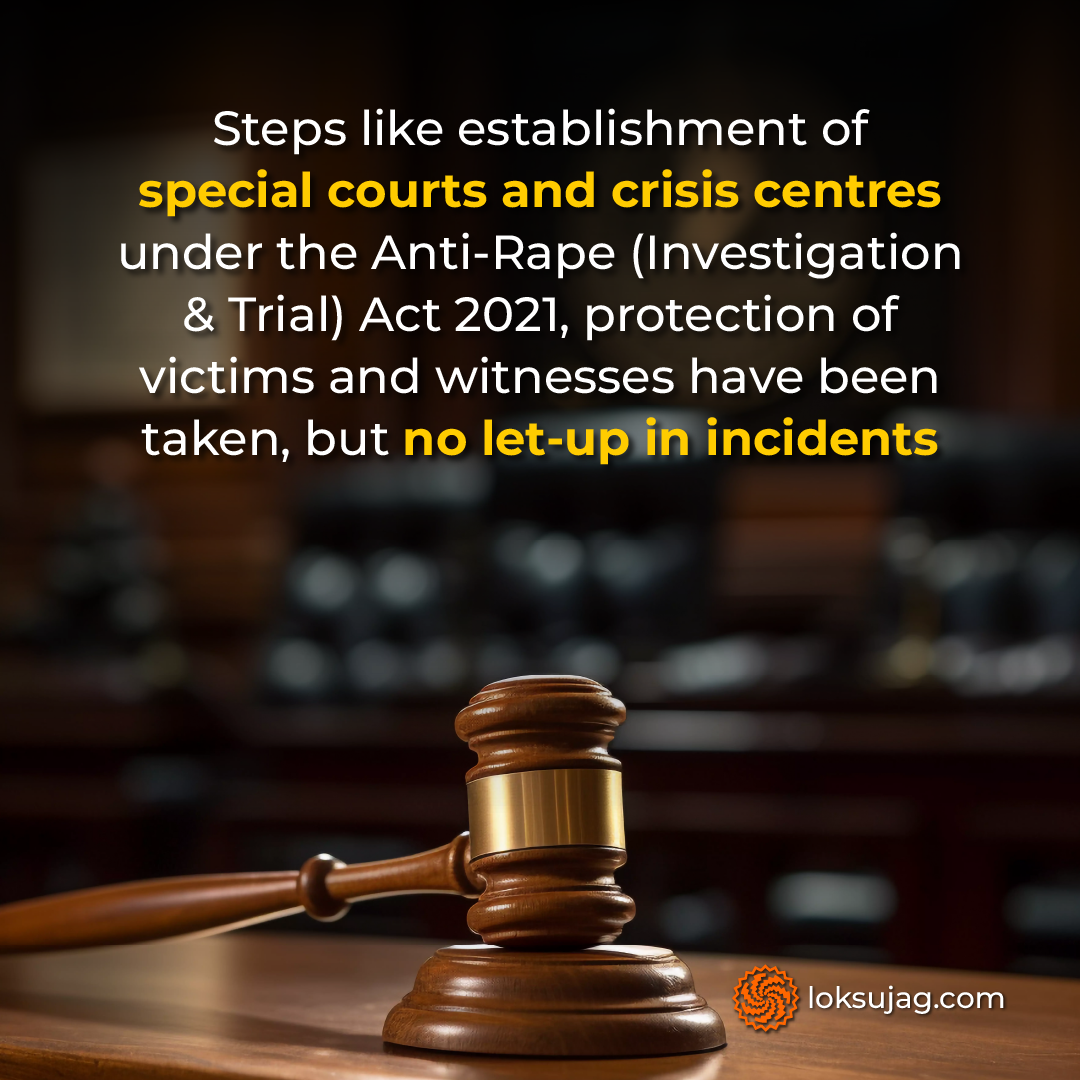
From Pakistan Penal Code to Hudood Ordinance
Since the Independence in 1947, the cases of sexual assault in the country were registered under sections 375 and 376 of the Pakistan Penal Code (Act 1860). Section 375 defines rape and section 376 prescribes its punishment.
Under this law, the punishment for rape is death or imprisonment for 10 to 25 years and a fine, while for gang rape, the punishment is death or life imprisonment.
However, in 1979, when the Hudood Ordinance came, rape was removed from the Pakistan Penal Code and placed under the category of ‘adultery’. That is, the difference between rape and adultery was almost eliminated.
Naila Dhoon, a lawyer associated with the Mianwali Bar Association, says that in the Hudud Ordinance, the accused and the victim appeared in the same dock. “For the implementation of ‘Hud’, the confession of the accused or four pious, sane and adult male witnesses were required as witnesses. In a rape case, the burden of proof was on the victim and no medical or documentary evidence was accepted, which made it very difficult for women victims of sexual crimes to get justice.”
However, in 2006, amendments were made to the Pakistan Penal Code, the Code of Criminal Procedure (CrPC) and other laws through an Act for the protection of women. Under these amendments, sections 265-B (kidnap for forced marriage), 367-A (kidnap for rape), 371-A (sale for prostitution) and 371-B (purchase for prostitution) were added to the Pakistan Penal Code and the definition of ‘rape’ in section 375 was also changed.
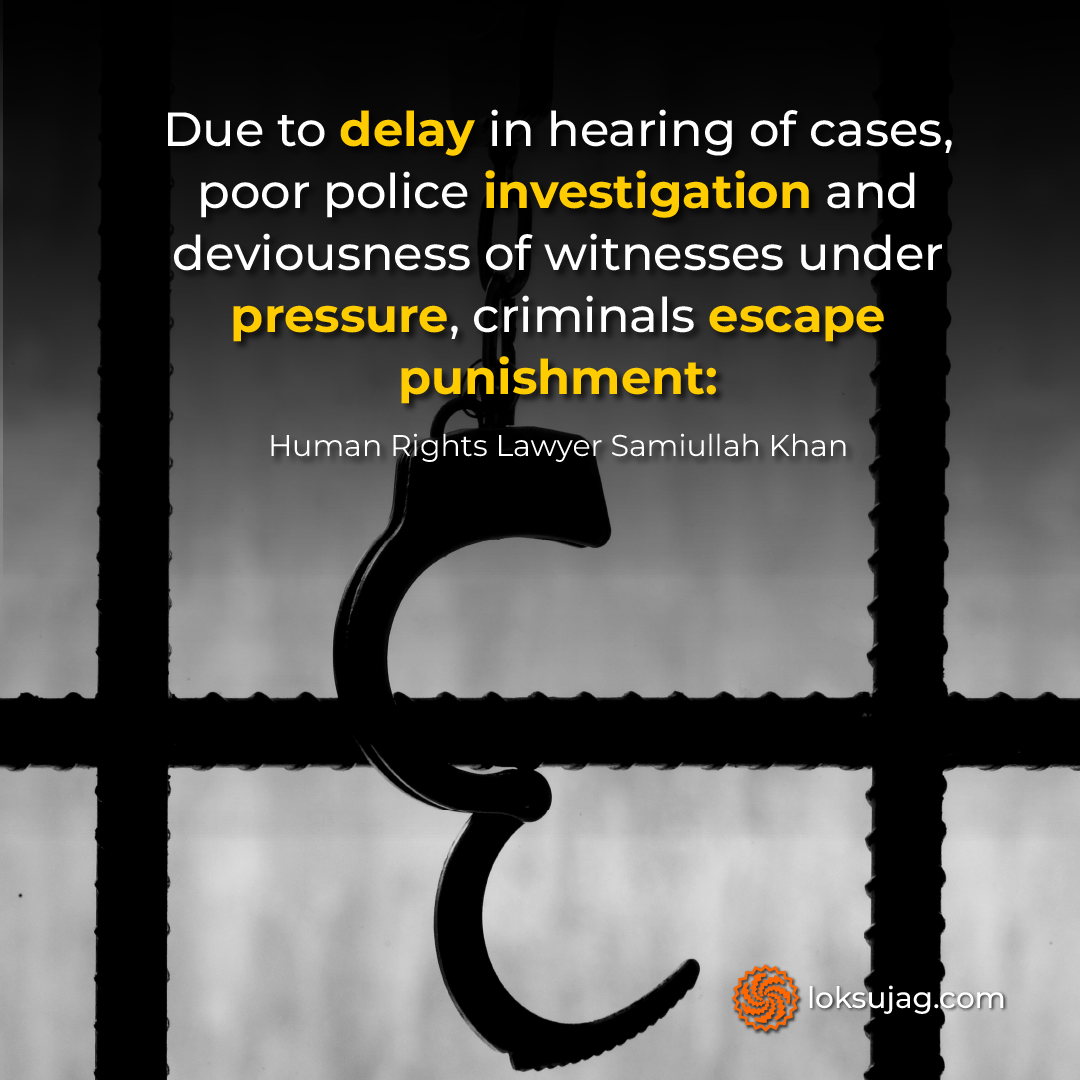
Amendment to 2006 law after Sialkot motorway gang-rape
Section 375 of the Pakistan Penal Code (Amendment Act 2006) reclassified rape and made it a penal offence. But the punishment (from 10 years imprisonment to death penalty) was left to the discretion of the courts.
Advocate Naila Dhoon believes that the steps taken in the Protection of Women (Criminal Laws Amendment) Act, 2006 were also very weak and full of flaws. This time too, rights were given with one hand and taken away with the other, but this improved the conditions of women somewhat.
On September 9, 2020, the horrific incident of gang-rape of a French woman of Pakistani origin on a motorway in front of her children sparked a debate in the country once again and changes were made to the laws.
On December 1, 2021, the Parliament passed the Anti-Rape (Investigation & Trial) Act 5, under which special courts were established across the country to hear rape cases quickly and they were made obliged to decide the case within four months. Crisis cells were set up in every district to register FIRs, provide medical examination and immediate assistance to the affected women in forensics. In this regard, the Punjab Police also formed units consisting of 1,450 officers, each of which includes at least one woman officer.
The law includes measures such as creating a system (national register) in collaboration with the National Database and Registration Authority (NADRA) to monitor criminals and deter them from reoffending, keeping their identities confidential to protect victims and witnesses, and using veils or video links. But even after this law, there has been no significant reduction in the incidence of sexual assault.
Issues of implementation and police training
According to gender parity reports, 3,914 cases of rape were reported in Punjab in 2022, 6,624 cases in 2023, and 4,641 cases in 2024.
Read this
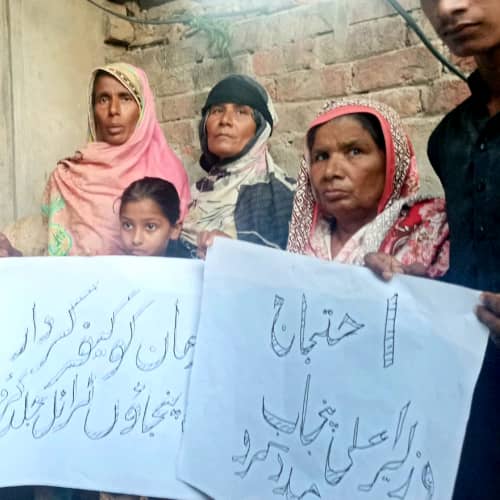
The rape and murder of a minor girl in Kasur: how the path to justice is strewn with procedural complications
Ansar Khan, a member of the Mianwali District Bar, believes that the Anti-Rape (Investigation and Trial) Act 2021 is an important legal development but it is not being fully implemented. The rate of referral of cases to Anti-Rape Crisis Cells (ARCCs) by the police is very low, due to which the victims do not get immediate help.
“Measures to protect victims and witnesses, such as anonymity and testimony via video link, are also virtually non-existent,” he adds.
Samiullah Khan, a human rights lawyer in Mianwali, disagrees with the views of female police inspector Jabal Al-Warid. He blames the poor police investigation and judicial system for the low conviction rate. He says that the majority of police officers are not sensitive to sexual crimes and lack proper training in evidence collection. Forensic labs are scarce, almost all samples are sent to Lahore, and often it takes six months for reports to arrive.
He believes that criminals often escape punishment due to delays in the court system (trials), poor evidence, and witnesses changing their statements under pressure.
Legal expert Khalid Saeed advocate says that changes to anti-human smuggling and trafficking laws and anti-rape laws are positive developments. However, the National Sex Offenders Register for monitoring is not yet fully operational.
“Just legislation is not enough, effective implementation of laws is more important, for which institutional training and public awareness are urgently needed,” he stresses.
Published on 16 Sep 2025
